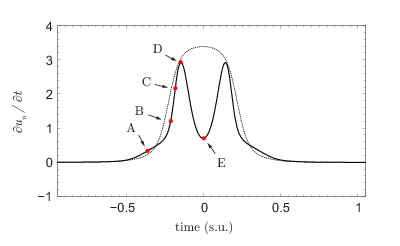Acoustic metamaterials and phononic structures
Acoustic metamaterials are artificial structures that present new striking and exotic properties that are not present in conventional or natural materials. In some frequency range, they can present dynamic negative compresibility and/or negative mass density, and strong dispersion and slow-sound. These new materials can be designed to obtain interesting properties such as perfect sound absorption, zero-sound transmission, focusing or specific scattering patterns.
Lines:
Perfect acoustic absorbers
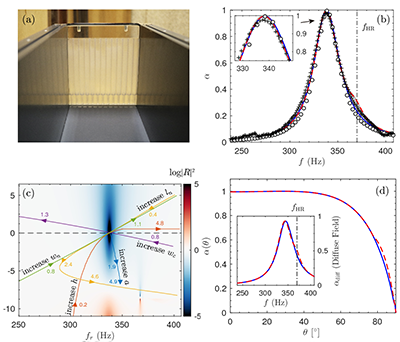
Artificial materials with strong dispersion can be obtained by using locally resonant structures. I'm designing perfect acoustic absorbers based on metamaterials. In the slow sound regime, the effective wavenumber inside the structures can be drastically increased, reducing the total thickness of the structure. Moreover, the tuning of the thermoviscous losses allows to critically couple the structure with the exterior medium, leading impedance matching and, finally, to perfect absorption.
A first type of problems are reflection ones, when a material is located on a rigid wall. In this case, absorption is easier to obtain. In the top image, we present the absorption and the refelction in the complex plane of a perfect absorber panel working at 350 Hz. The panel is only 1.1 cm thick. Thus, the structure perfectly absorb an incoming acoustic wave with a wavelength 88 times longer than the panel thickness.
A second type of problem is transmission one, when a material like air is located at both sides of the absorber. In these conditions, such as in ventilated materials, absorption is hard to get, but using engineered metamaterials one can obtain even perfect absorbers for ventilated materials. For example, using resonances and strong dispersion sound waves can be slowed down to a few meters per second. Then, efficient and thin absorbers can be designed by tuning thermoviscous losses and using Fabry-Perot resonances.
N. Jiménez, W. Huang, V. Romero-García, V. Pagneux, J. Groby,
Applied Physics Letters, 109 (12), pp 121902, (2016)
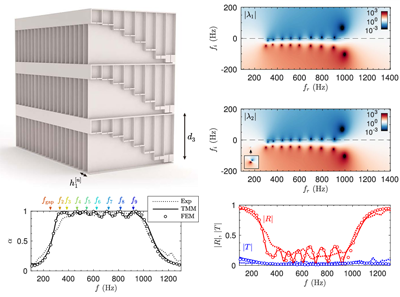
N Jiménez, V Romero-García, V Pagneux, JP Groby,
Scientific Reports, 7, pp 13595, (2017)
N. Jiménez, V. Romero-García, V. Pagneux, J. Groby,
Phys. Rev. B, 95, pp 014205, (2017)
V Romero-García, N Jiménez, JP Groby, A Merkel, V Tournat, G Theocharis, O Richoux, V Pagneux,
Physical Review Applied, 14 (5), pp. 054055, (2020)
L Barguet, V Romero-García, N Jiménez, LM García-Raffi, VJ Sánchez-Morcillo, JP Groby,
Scientific Reports, 11, pp 711, (2021)
A. A. Fernández-Marín and N. Jiménez and J.-P. Groby and J. Sánchez-Dehesa and V. Romero-García,
Appl. Phys. Lett., 115, (6) pp 061901, (2019)
N. Jiménez, V. Romero-García, A. Cebrecos, R. Picó, V. Sánchez-Morcillo, L. G. Raffi,
AIP Advances, 6, pp 121605, (2016)
Scattering control by metasurfaces
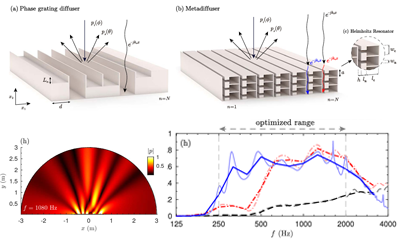
The phase of the reflected waves by a spatially modulated media can also be tailored to obtain a specific phase pattern, leading to the precise control of the scattering of acoustic waves. Using metasurfaces based on Helmholtz resonators ultrathin sound diffusers can be designed. These panels, called metadiffusers, can find practical application on room acoustics, leading to panels orders of magnitude thinner and lighter than traditional Schroeder diffusers.
Another innovative application of this phenomena is to reduce the acoustic load and vibrations in the launch-pad during the lift-off of a rocket. We are applying these concepts in collaboration with the European Space Agency (ESA) to reduce the acoustic load during the launch of space vehicles.
The performance of sound diffusers can be improved by using structures with chiral geometries. For example, by using a holographic projection of an acoustic vortex, we can generate an acoustic panel with spiral geometry that twists scattered waves, and the wavefront forms a whirlpool. As waves interfere destructively 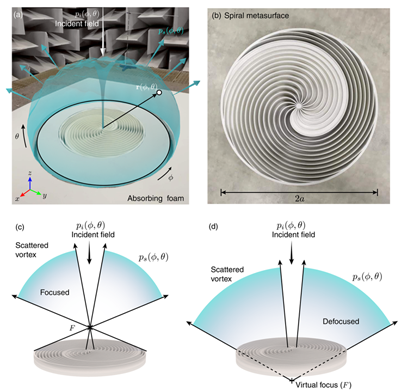 at the axis, where a phase dislocation is produced, the panel shows no specular reflection, while in the rest of directions, scattering is very uniform.
at the axis, where a phase dislocation is produced, the panel shows no specular reflection, while in the rest of directions, scattering is very uniform.
N. Jiménez, T. J. Cox, V. Romero-García, J. Groby,
Scientific Reports, 7 (1), pp 5389, (2017)
N Jiménez, J Groby, V Romero-García,
Scientific Reports, 11, pp 10217, (2021)
LM García-Raffi, LJ Salmerón-Contreras, I Herrero-Durá, R Picó, J Redondo, V Sánchez-Morcillo, K Staliunas, A Cebrecos, N Jiménez, V Romero-García,
Aeroespace Science and Technology, 73, pp 300-308, (2018)
E. Ballestero, N. Jiménez, J.-P. Groby, S. Dance, H. Aygun and V. Romero-García,
Applied Physics Letters, 115(8), pp 081901, (2019)
E Ballestero, N Jiménez, JP Groby, H Aygun, S Dance, V Romero-García,
Applied Physics Letters, 119(80), pp 044101, (2021)
E Ballestero, B Hamilton, N Jimenez, V Romero-García, J Groby, H Aygün, S Dance,
Applied Sciences, 11(7), pp 8084, (2021)
Focusing devices
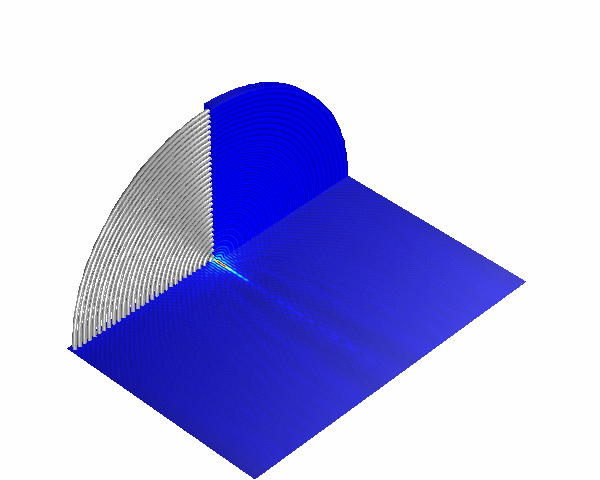
By the specific control of the anisotropic dispersion of spatially modulated media and metamaterials, the phase of the transmitted field can be specially tailored to produce focusing and beam generation. Here, I'm working on focusing and vortex beam generation by periodic structures and metamaterials.
N. Jiménez, V. Romero-García, R. Picó, L. M. García-Raffi, K. Staliunas,
Applied Physics Letters, 107, pp 204103, (2015)
Nonlinear waves in phononic crystals

I'm studying nonlinear wave processes in spatially modulated media such as multilayered acoustic media, phononic crystals or sonic crystals. The rich nonlinear dynamics of these system are characterized by its strong dispersion. Here, harmonic generation processes and its relation with their band structure are explored. We found that the nonlinear processes can be enhanced, strongly minimized or simply modified by tuning the material dispersion relation. Thus, the combined action of nonlinearity (harmonic generation) and periodicity (different propagation velocities and attenuation for the different harmonics) results in novel and unexpected phenomena with respect to the linear counterpart, and opens the door to new mechanisms of acoustic wave control and manipulation.

A. Cebrecos, N. Jiménez, V. Romero-García, R. Picó, V. Sánchez-Morcillo, L. García-Raffi,
AIP Advances, 6, pp 121601, (2016)
N. Jiménez, A. Mehrem, R. Picó, L. M. García-Raffi, V. Sánchez-Morcillo,
Comptes Rendus Physique, 17 (5), pp 543 - 554, (2016)

E. M. Hamham, N. Jiménez, R. Picó, V. Sánchez-Morcillo, L. G. Raffi, K. Staliunas,
Phys. Rev. B, 92, pp 054302, (2015)
Nonlinear waves in lattices
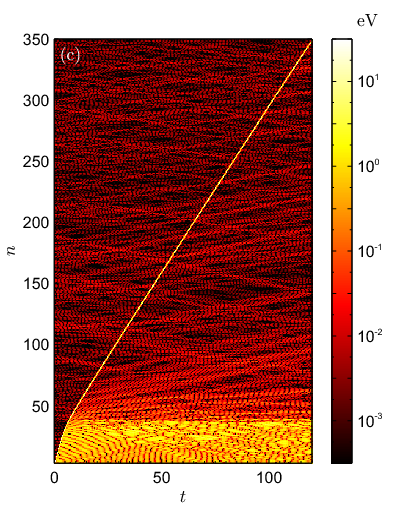
I'm also exploring intense nonlinear waves in lattices of coupled oscillators. An example are strain waves in a chain of cations coupled by realistic interatomic potentials. In this case, the nonlinear ionic interactions and lattice dispersion lead to the formation of supersonic kinks. These intrinsically-nonlinear localized dislocations travel long distances without changing its properties and can explain the formation of dark traces found in muscovite-mica crystals.
J. F. Archilla, Y. A. Kosevich, N. Jiménez, V. Sánchez-Morcillo, L. M. García-Raffi,
Physical Review E, 91 (2), pp 022912, (2015)
A Meherem, N Jiménez, LJ Salmerón-Contreras, X García-Andres, LM Raffi, R Picó, VJ Sánchez-Morcillo,
Physical Review E, 91 (1), pp 002200, (2017)
J. Chaline, N. Jiménez, A. Mehrem, A. Bouakaz, S. D. Santos, V. Sánchez-Morcillo,
The Journal of the Acoustical Society of America, 138 (6), pp 3600-3606, (2015)
